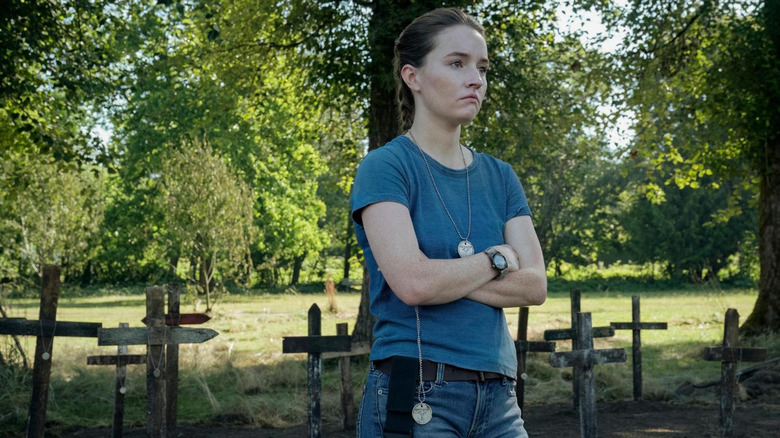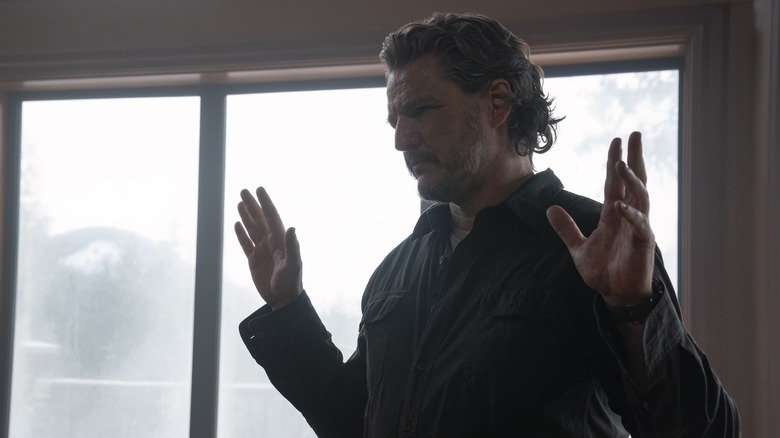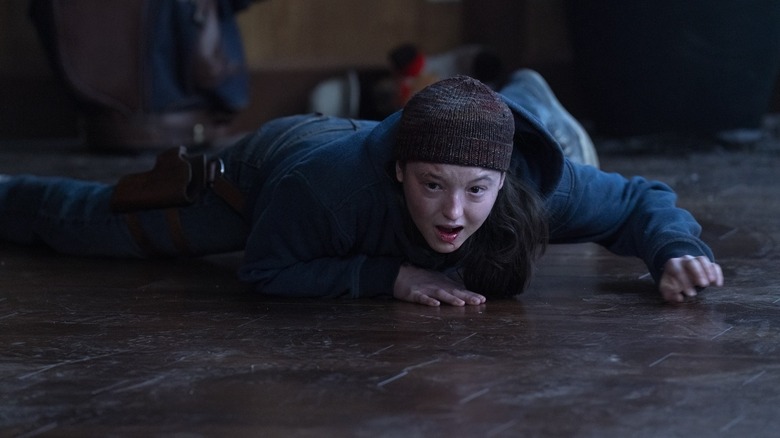The Tiny Last Of Us Season 2 Detail That Makes [SPOILER]'s Death Even More Devastating
Put the golf clubs back in their bag and leave the lodge if you haven't watched "Through the Valley," the second episode of the second season of "The Last of Us." Spoilers incoming — don't say you weren't warned!
People who played the 2020 video game sequel "The Last of Us Part II" all knew this was coming, but they might not have expected it this soon. In the second season of game creator Neil Druckmann and prestige TV veteran Craig Mazin's adaptation of "The Last of Us" on HBO, viewers watched in shock and horror as, at the end of the season's second episode "Through the Valley," Abby (Kaitlyn Dever) kills Joel Miller, one of the series protagonists who's played by Pedro Pascal. At the end of the show's first season, Joel kills an entire building's worth of rebel Fireflies to protect his surrogate daughter Ellie (Bella Ramsey), who's immune to the cordyceps virus ... and could be vital to finding a cure, but she'd have to die for that to even be possible. Joel decides to murder a bunch of people, including an unarmed doctor who, we learn in "Through the Valley," was Abby's father ... and five years afterwards, he pays the ultimate price.
In an interview with The Hollywood Reporter, Mazin said that, even though anyone familiar with the video game knew Joel's fate, he still wanted the scene to be filled with so much suspense and dread that they'd wonder if he could survive this attack from Abby somehow. "The audience should question everything," Mazin said before saying that despite Abby's insistence that she will kill Joel, she can change her mind. "But what was important here was that when Joel ends up in that room with Abby and her friends, that we are not shocked. We are, in fact, in a state of dread because it's happening. We keep thinking there's got to be a way out of this until the very end."
That's when Mazin spoke to one of the scene's saddest — and most crucial — moments. "And it was important, that beautiful moment where Ellie says, 'Joel, please get up' — that's us," Mazin said, confirming that this addition was created just for the show. He continued:
"And he tried that finger movement. It's just heartbreaking. Mark [Mylod, the episode's director] and I spent so much time just talking about where everybody would be. We spent the day on the floor, trying different positions, finding that perfect place of connection and where everybody else would be. It was so much about making sure that Bella and Pedro and Kaitlyn were able to do this maximally upsetting thing."
Joel realizes he deserves his fate, according to Craig Mazin
Another deeply horrifying aspect of Joel's death scene is that he's not only powerless to stop Abby — she and her friends outnumber him and Dina (Isabela Merced), a Jackson resident who is both Ellie's best friend and a new sort of surrogate daughter to Joel — but he doesn't appear to want to stop Abby. According to Mazin, Joel's reluctance and unwillingness to fight back at all is a major part of both the narrative and Joel's character.
"When Abby tells him, 'I'm going to kill you, because there are some things we all agree are just f***ing wrong,' there is this slight moment of agreement," Mazin told interviewer James Hibberd. "Joel knows what he did is capital-W Wrong. But he also had no choice [but the kill the Fireflies last season], as far as he saw it. He did what he needed to do. So we already know that he has some guilt about it from the therapy scene in episode one." (With that last part, Mazin is referring to Joel's scene with Jackson's resident therapist Gail, who's played by Catherine O'Hara; that particularly impactful sequence actually took an entire day to film.)
Mazin also told Hibberd that one big change in "Through the Valley" helps inform Joel's mindset — which is that, in the game, Joel's brother Tommy (Gabriel Luna) is with Joel and Abby's gang when he dies. The show puts Dina into the action instead, and it simply reinforces that Joel will always protect people he loves, a category that includes Dina. "It's also one of the reasons we made a change from the game to have Joel in that room with Dina, as opposed to Tommy, who's a big, tough guy," Mazin clarified. "Abby is basically saying, 'Make one mistake and we're going to kill her.' And if there's one thing we know about Joel, it's that he's sort of the ultimate dad. We know he cares very much about Dina and that he would never let her suffer in any way, shape, or form, to defend himself."
Craig Mazin thinks that all of the connections made in The Last of Us made this scene particularly profound
Okay, so why? Why does any of this happen, besides the relatively simple explanation (which is that Abby loved her father and wants to punish the man who killed him)? For a show that's ostensibly about a zombie apocalypse, "The Last of Us" actually puts a great deal of focus on the ways humans treat each other after society collapses, and this is a perfect example. Even though Joel saves Abby from an infected horde just a little while before she brutally kills him, she can't see past her own myopic need for revenge, somehow able to look away from the common enemy affecting them both to get vengeance.
"This is how things end," Craig Mazin told James Hibberd, putting it bluntly before continuing on to say that this moment and sequence in "The Last of Us" is just ... what humanity is about, at the end of the day. He continued:
"We break all relationships, all the great loves of our life. The connections we have with our parents, our children — they break. And how we deal with that is the most specific of human suffering. I just thought it was so profound to take this girl — who had been literally born in blood, who had been an orphan — who was then handed off to this guy and give her a chance at this [experience]. It takes what's maybe the most beautiful connection — the great bond between a parent and a child — and then breaks it. What does that do to her? And that is, to me, why it was important to do. It's not because it's going to upset people. It's important to do it because that's why we make these stories. In a somewhat safe environment, we explore the things we are all going to feel and experience, and then question how we deal with those things."
"The Last of Us," including this absolutely gutting scene, is streaming on Max and HBO now — and new episodes drop on Sunday nights at 9 P.M. EST.


